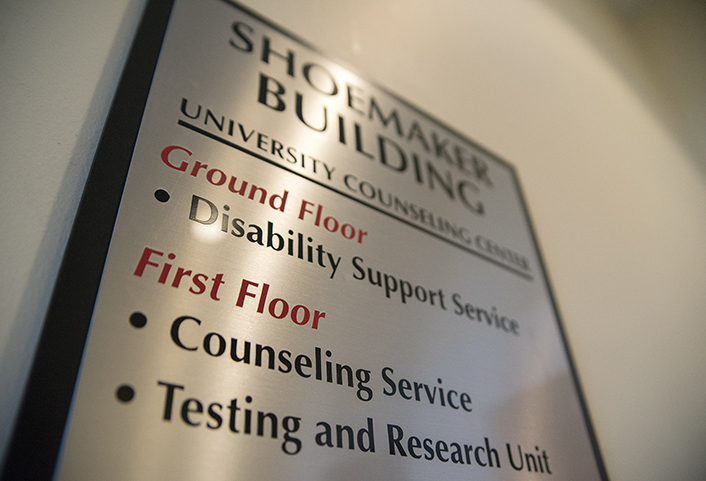This article is part of The Diamondback’s 2021 Orientation Guide. Click here for the rest.
By Rachel Hunt and Sofia Garay
Mental health is all about being proactive. For me, talking about mental health in high school was very taboo. If I wasn’t joking about how I felt or diminishing those feelings, I felt like I was making people uncomfortable.
College was the first time I was surrounded by people who were proud of the steps they took to get help. Even as I enter my senior year of college, I still have trouble removing the stigma of not being OK all the time.
Below are a few measures you can take to prevent a buildup of unhealthy emotions that I wish I had known going into college. And while I’m not a mental health professional, I have experience and advice related to being in cognitive behavioral therapy and group therapy as well as managing medications. (I’ll spare you my DSM-5 diagnoses.)
Decide what kind of care you need
Decide at the beginning of the year what kind of care you need to maintain an emotionally healthy state of being. This could mean anything from getting professional help and regularly journaling to scheduling planned calls with friends or family. Err on the side of caution.
Medication and talk therapy don’t have to be mutually exclusive, either. Most therapists you talk to will recommend that you eat well, exercise and get enough sleep. TherapistAid.com has dozens of free resources that can help you identify how you’re feeling, manage stress, practice mindfulness and develop healthy habits. Joining group therapy can also be a cheaper alternative to individual therapy.
If you’re looking for a free option, consider joining a faith-based organization, whether that be University of Maryland Hillel, the Catholic Student Center or any other religious group on campus. This can be a great way to build community with like-minded people and they can usually connect you with spiritual mentors. Of course, remember this should be in addition to professional advice rather than in complete substitution of it. Self-diagnoses are not medical diagnoses.
Watch what you consume
While this isn’t a catch-all for mental health issues, watch what you consume on social media and in your everyday life. There can be many dangerous “clickholes” on the internet — accounts or threads advertising themselves as mental health resources, but instead just being triggering.
TikTok is one of the worst places for this because the algorithm can pick up on various issues you’re struggling with and make it hard to escape from the sometimes pessimistic dialogue. Luckily, if you hold down on the video, you can flag it or mark yourself as “Not interested.”
Take a critical look at the hashtags you explore, people you follow, music you listen to and movies you watch. Just like you are filtering what sentimental items and clothing you’re bringing to college, you should be sorting through what social media habits you should keep or ditch.
Set boundaries and manage accountability
“Boundaries” might sound like a scary word. View them simply as protections you put around yourself. These boundaries can be physical, emotional, intellectual, social or spiritual. Making a list of traits you look for in a friend or partner before getting to college can be a great place to start. That way, you can identify what you subconsciously compromise on when those people actually come around.
Talking to your future roommate about dorm etiquette is a great example of boundary setting. Time is one of the biggest boundaries we sometimes underestimate. If you’re unsure about how you’re doing with your boundaries in any regard, ask yourself: Am I taking more or giving more?
Once you’ve set these boundaries, you can move into being held accountable. Ask a friend or mentor to give you a heads-up if you start breaking your own boundaries. This could be anything from having too many drinks at the bar to not submitting your homework assignments on time. You can also give someone signs of when to check on you, like if you haven’t left your room in a while or have started skipping meals.
You are to some extent responsible for yourself, so don’t completely blame your bad decisions on other people for not saying anything. Don’t blame your mental breakdown on someone’s inability to recognize that you’re struggling, either. That would be overstepping their boundaries.
Get a hobby
Your happiness should not be dependent on how successful you are in your future career. Your worth is not dependent on what you do. Find what gives you joy and pursue it.
This could be joining a club sport, making art, learning a new language, doing yoga exercises or reading about a niche subject. Oftentimes, what we’re studying does overlap with what we love, but we have to be careful not to lose sight of who we are outside of academics.
It can be really hard to untangle our worth from our productivity. Sometimes it’s nice to keep these hobbies private so you don’t have to fend off exhausting criticism or discussion that distracts you from simply doing you. By having something that’s just ours, we realize that we can be creative and pleased by something that doesn’t necessarily benefit other people.
If you’re not sure what to do, try something new! Join a club that piques your interest or Google a list of hobbies to explore. Finding some sort of creative and/or physical outlet is beneficial to you because it can prevent a buildup of stress and other negative emotions.
This isn’t a comprehensive list that will guarantee you a sparkling mental health status, but it is a place to start if you’re worried about the upcoming stress of navigating new relationships, academic responsibilities and extracurricular endeavors. Life isn’t just about surviving. You’re meant to thrive. Good luck on your journey! I believe in you.
***
Maintaining one’s physical health isn’t all about hitting the gym for three hours a day or only eating vegetables. It’s more about remembering to maintain a balance of these four wellness areas: Having good nutrition, incorporating exercise into your daily schedule, getting enough sleep and learning to manage your stress.
According to Jane Jakubczak, a registered dietician at the University of Maryland, those four wellness areas are what affect students’ overall health and well-being.
It can be hard to resist the urge to indulge in Marathon Deli fries or Maryland Dairy ice cream, but food is fuel, and you want to give your body the right kind. This doesn’t mean you can’t enjoy the foods you love — but just be aware of what you put into your body and how it makes you feel.
Jakubczak said students should “think of it like refueling the tank or refueling the brain.”
Eating at least three full meals a day is important so your body has enough energy to get you through a hard day of classes and extracurriculars, which is recommended by Harvard Health. I recommend scheduling your meals in advance, and if you know you aren’t going to have time, try packing a meal or snack beforehand.
Eating right isn’t the only behavior that will help maintain your health, though — incorporating some form of exercise into your day, even if it’s just walking to classes, will also help you become healthier and fit.
According to Jakubczak, about 30 to 60 minutes is the recommended amount of exercise per day. This doesn’t mean you have to spend hours doing cardio or weightlifting. You should find activities you enjoy — maybe that’s playing an intramural sport such as pickleball or soccer, or taking zumba and yoga classes.
University Recreation and Wellness classes helped senior kinesiology major Hannah Fields stay active while living on campus during her freshman year. Fields recommends taking advantage of classes offered by RecWell because they’re fun and free to students, she said.
In order to have energy for any activities on top of school, you also need to prioritize your sleep, which is arguably the hardest part of staying physically healthy. Sleep is one of the most important aspects of your physical health because it affects every other aspect of your life, Jakubczak said. Without enough sleep, you can’t function properly, and you won’t have adequate energy to do your assignments, study or even pay attention to your classes.
Fields notices a difference in her energy levels and performance in school when she does not get a good night’s sleep, so she makes sure to prioritize her sleep while at school, she said.
“I’m a really big proponent of getting enough sleep,” she said. “I really do make sure I’m getting eight hours of sleep every night because I know it’s what makes me feel my best.”
She also recommended that as you’re getting accustomed to a new life in college, you should also take everything with a grain of salt and find what works best.
“You’re still figuring out a new space and … it’s a whole new life,” Fields said.
The university’s Counseling Center recommends seven to nine hours of sleep for college students as “anything less than 7 hours per night can impact your functioning.” Instead of pulling an all-nighter to cram for an exam, get that extra hour of sleep so you can be well-rested for the exam and retain the information better.
The University Health Center also offers plenty of resources for students looking to stay physically healthy — from peer nutrition coaching and consultations with a registered dietician to meditation services and peer wellness coaching.
Most importantly, I recommend listening to your body. You know your body best, and a lifestyle that consists of salads and gym days may not be the best fit for you. Find what you enjoy and do what makes you feel your best so you can do your best in school.



